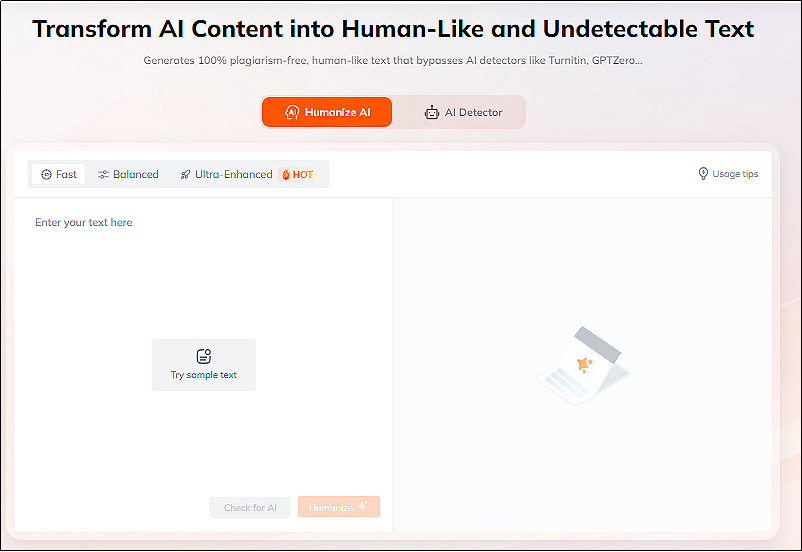What Does Perplexity & Burstiness Mean in AI and Human Writing?
When evaluating the quality of AI-generated text, two key metrics often come into play: perplexity and burstiness . What exactly do these terms mean, and how do they impact AI and human writing?
These terms describe characteristics of text generation models like ChatGPT. Understanding them can help improve how these models are utilized for content creation.
Catalogs:
What Is Perplexity?
Perplexity is a measure of how surprised an AI language model is by a given sequence of words. Basically, it checks how unexpected or unusual the word choices are. If the perplexity value is high , it means the model found the word combinations more unusual or surprising.
Example of Perplexity
Consider these two sentences:
-
Sentence 1: "The quick brown fox jumps over the lazy dog."
-
Sentence 2: "The dog jumped over the lazy fox, quickly brown."
Sentence 2 would likely have a higher perplexity because it contains less common word order and phrasing.
What Is Burstiness?
Burstiness refers to the variability in word usage within a text. High burstiness means the text has a mix of usual and unusual words, making it more dynamic. Low burstiness, on the other hand, shows that the words are more evenly used throughout the text.
Example of Burstiness
-
Text A: "The cat sat on the mat. The dog chased the cat."
-
Text B: "The feline perched upon the floor covering. The canine pursued the feline."
Text B has a higher burstiness due to its use of more uncommon words (e.g., "feline," "perched," "pursued").
What is the Relationship Between Perplexity and Burstiness?
Understanding the relationship between perplexity and burstiness is crucial in AI detection work , because detectors often use these metrics to distinguish between AI-generated and human-written text.
Perplexity and burstiness are interconnected. Typically, higher perplexity means higher burstiness, as more unexpected word choices can lead to a wider range of word frequencies. However, it's important to note that this relationship is not always straightforward, and other factors can influence these metrics.
Is High Perplexity and Burstiness Good?
Yes, generally speaking, high perplexity and burstiness are good indicators of quality in AI-generated text, because they make text sound more natural.
-
High perplexity: This suggests that the AI model is generating diverse and unexpected word sequences, which can make the text more interesting and engaging.
-
High burstiness: This indicates a mix of common and uncommon words, which can contribute to a more natural and varied writing style.
But it's important to note that extreme levels of perplexity or burstiness can sometimes lead to nonsensical or incoherent text.
How to Increase Perplexity and Burstiness in Your AI Prompts
1. Provide More Specific Prompts
Enhance your prompts by including details like examples, style guidelines, and background information.
-
Instead of: "Write a story about a cat."
-
Try: "Write a story about a quantum physicist cat who solves a murder mystery in a parallel universe."
2. Experimenting with Different Phrasings
Varying the length, phrasing, and keywords in your prompts can help increase the perplexity and burstiness of the AI-generated content.
-
Instead of: "Describe a beautiful sunset."
-
Try: "Paint a vivid picture of the dying embers of the day kissing the horizon."
3. Ask Open-ended Questions
Ask open-ended questions and suggest different perspectives to enhance the depth and breadth of AI-generated content.
-
Instead of: "What is the meaning of life?"
-
Try: "If emotions could have colors, what would jealousy look like and why?"
4. Transfer Style
Explore different writing styles to push the boundaries of AI-generated content.
-
Try : "Write a Shakespearean sonnet about a robot falling in love with a human."
-
Try : "Compose a rap song about the history of artificial intelligence, in the style of Eminem."
How to Make AI Write Like a Human - 5 Methods
These methods focus on refining the AI's language capabilities and adapting its output to mirror human nuances in communication. By exploring these 5 methods and incorporating key linguistic concepts such as burstiness and perplexity, we can guide AI to produce text that feels more natural, emotional, and personalized—qualities that are inherently human.
Method 1: Try Bypass AI Detection Tools

Use advanced tools designed to refine the output of AI-generated text, making it appear more natural and human-like.
One effective tool is Tenorshare AI Bypass , which not only helps in avoiding AI detection but can be adjusted to vary perplexity, ensuring the content feels genuine and less machine-like.
Method 2: Add Personal Touches
Add personal stories or unique experiences to make your content feel more human-like. This is effective for blogs or customer service, where you really want to connect on a personal level. Try using made-up scenarios or adapt real-life stories to help give your AI's output a more authentic and individualized voice.
Method 3: Mix Up Your Sentences
Keep your writing lively by varying the lengths and structures of your sentences. This technique not only captures how humans naturally speak—emphasizing points, showing excitement, or elaborating on thoughts—but also boosts the readability and engagement of your content. This dynamic approach ensures your writing stays engaging and prevents it from becoming monotonous.
Method 4: Using Emotional Language
Choose words and phrases that evoke strong feelings to better connect with and move your audience. This method, enhanced by adjusting the perplexity levels, works by mimicking the emotional depth of human communication, making AI-generated text more persuasive and memorable.
For example, in marketing, using urgent and exciting phrases like "act now" or "once in a lifetime" can spur action, while in storytelling, vivid descriptions of scenes and feelings can pull readers into the narrative.
Method 5: Using Informal Language
Embed phrases and expressions that reflect the informal speech of your target audience. For younger demographics, using current slang can make the text resonate and feel genuine, while local expressions can increase relevance for specific geographic areas. Balancing burstiness in these casual expressions helps maintain a natural flow, making it more relatable.
Final Words
Understanding perplexity and burstiness is crucial for anyone using AI writing tools. These metrics not only influence how natural the text sounds but also guide improvements in AI writing technologies.
To further optimize these aspects, using advanced Humanizer AI tools like Tenorshare AI Bypass can be highly effective.This tool specifically tailors AI-generated content to appear more natural by adjusting perplexity and burstiness levels. Moreover, It helps your AI text avoid detection by most AI detectors, ensuring a higher degree of human likeness and quality in the output.Let's give it a try today!
Tenorshare AI Bypass
- Create 100% undetectable human-like content.
- Bypass All Al detector tool like GPTZero, ZeroGPT, Copyleaks, etc.
- Original content, free of plagiarism and grammatical errors.
- One-Click AI bypass with a clean and easy-to-use interface
You Might Also Like
- How to Use ChatGPT Commands to Get Human Content
- How to Make AI Writing Undetectable in 2026: Effective Strategies and Tools
- How to Beat Turnitin AI Detection 2026 in 5 Ways
- How to Avoid AI Detection in Writing? 7 Proven Techniques
- Smodin AI Detector Review : How Accurate Is It?
- Rewritify.ai: In-Depth Review of Key Features, Effectiveness, and Alternatives
- Understanding How AI Content Detectors Identify AI-Generated Text
- How to Make ChatGPT Undetectable Free? 8 Proven Methods

